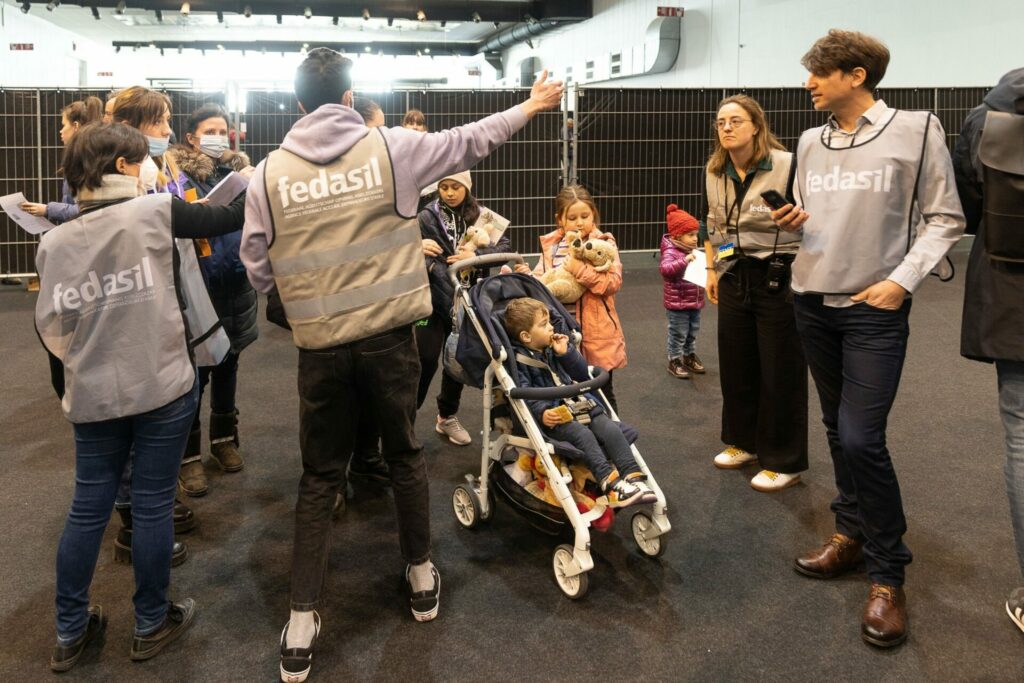Financial compensation for host families, new refugee ‘villages’, and new housing, are part of the Brussels-Region Government's plans to accommodate up to 300 refugees per day who arrive in Brussels’ reception centres.
The plan to help accommodate new refugee arrivals was announced on 12 May by Pierre Verbeeren, Ukraine coordinator for the Brussels-Region Government and was reported by RTF.
Since the start of Russia’s invasion of Ukraine, almost 6 million refugees have fled the country, 78,000 of which have arrived in Belgium. Thus far, the Belgian authorities have succeeded in officially registering around 40,000 of these new arrivals.
Belgian Secretary of State for Asylum and Migration, Sammy Mahdi, had previously stated that Belgium expects to receive up to 200,000 Ukrainian refugees during the course of the conflict.
Belgium, already under acute stress from previous waves of refugee and migrant arrivals, is struggling to accommodate this influx of Ukrainians.
Housing and space issues
Housing is in short supply. An additional 7,200 permanent houses are needed to accommodate new arrivals, primarily in the capital, which has become a hub for receiving asylum seekers.
Much of the initial wave of arrivals found temporary accommodation with local host families, who welcomed Ukrainian families into their homes. These stays rely upon the hospitality of ordinary Brussels residents, but are intended to be temporary while the local authorities search for nearby social housing.
Verbeeren states that those who host Ukrainian refugees have experienced support and assistance from the state.
“I can confirm that the families who host have a very supportive and sustained experience, it can be difficult to thank them, we must support them,” Verbeeren told RTL.
Financial compensation for hosts
In order to close the deficit in permanent accommodation, many Brussels host families will now receive “financial compensation for the fact that they are hosting.”
“These allowances will come from the government money set aside for the social integration of Ukrainian and “contribute to the expenses of the household,” says Verbeeren. This financial support could amount to around €150 per Ukrainian individual and an additional €50 for dependent children.
While most hosting arrangements are successful, sometimes arrangements fall through. The Brussels government will provide hosts and refugees with “exit solutions” in case either party intends to break the agreement.
“The Brussels Region is setting up a hotel dedicated to this, where people can be accommodated while finding new solutions for them,” the coordinator said.
It will not be easy, Verbeeren admits. Empty office spaces and other buildings are being retrofitted with sanitary facilities and large kitchens in order to temporarily accommodate Ukrainians.
Refugee 'villages'
Across Belgium’s capital, modular “villages”, which the coordinator assures are not real villages, will be constructed to accommodate up to 500 additional Ukrainian refugees. These camps will be a temporary solution, while more long lasting accommodation is devised.
These encampments will be built from quality modules, rather than containers or tents. There are no plans, the official insists, to build large camps like those that appeared across Europe during the Syrian refugee crisis, however the official did not dismiss that if the situation changed dramatically, a “plan B” would have to be devised.
Related News
- Hosting Ukrainian students will cost French-speaking schools up to €94 million
- Belgium creates hotline for Ukrainian refugees to report abuse
Despite the pressures, Verbeeren assured that “it’s going well.” To date, 6,000 people have arrived in Brussels. “Belgium managed to face the challenge correctly,” he concluded.
The Belgian Federal Government and other regional authorities have been criticised for their response to the refugee crisis. Early days of the crisis were marked by long queues outside of refugee registration centres and some refugees complained of being “just numbers on paper.”

